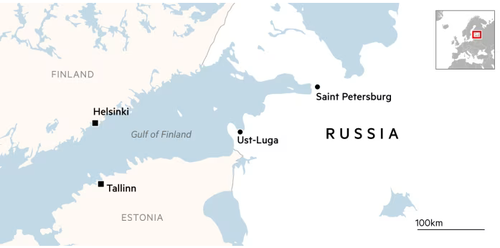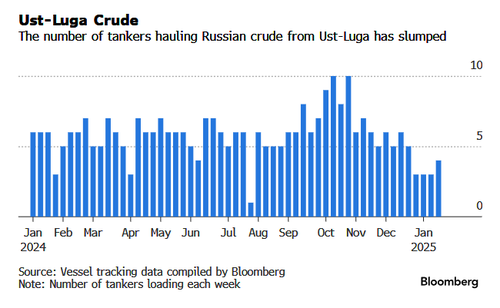
Russian Oil Flows From Second Biggest Baltic Port Unexpectedly Tumble
Two weeks after Biden’s handlers, in one of their last and generally unexpected acts, unveiled draconian sanctions on Russian oil exporters and tankers, Russian oil exports from the country’s second-largest export facility on the Baltic Sea have unexpectedly plunged in the past several weeks, a slump that adds to wider questions about the nation’s petroleum flows as Western sanctions ramp up.

According to Bloomberg, shipments from the Baltic port of Ust-Luga tumbled in the final two weeks of December, a period in which six out 14 scheduled cargoes failed to load. Russia then planned, and has so far exported, a much smaller amount this month than would be normal in January.

Despite speculation it is related to the Biden executive order, there is no clear explanation for the slump, especially since Russia, which has become secretive about its oil flows since the war in Ukraine and ensuing Western sanctions, has refused to address the sharp drop.
As noted above, on Jan. 10 the outgoing Biden administration announced the most aggressive sanctions on Russia’s oil trade since the war on Ukraine began, but even before then tankers used by Moscow were becoming increasingly restricted by Western measures, particularly vessels designated by Washington.
Even though the wind-down period for dealing with the sanctioned barrels and vessels ends only on Feb. 27, there are already signs that Russian supplies could be squeezed by the latest measures, with buyers seeking cargoes elsewhere and tankers U-turning away the nation’s ports. The result has been the previously noted surge in Chinese shipping rates as Beijing scrambles to find alternative sources of oil.
Notably, the drop from Ust-Luga predates the latest sanctions. In the first half of January, Russian crude flows from the port averaged about 277,000 barrels per day, a 44% drop from December’s already-low levels, ship-tracking data compiled by Bloomberg show.
This month’s flows from the port are on course to be the lowest since July 2021, with industry data seen by Bloomberg showing roughly what vessel tracking shows.
The timing of the Ust-Luga plunge coincides with when an unspecified — and temporary — incident happened at the Unecha pump station to the east of Belarus that was reported by the Belta news agency at the time. The decline also comes when Ukraine has been targeting Russian energy infrastructure with drones. Ust-Luga itself was struck in early January although the incident didn’t appear to cause any curtailment to crude flows.
While there have been 11 storm days at Ust-Luga in the first half of January, Transneft doesn’t normally cut planned flows because of expected adverse weather. Shipments from the nearby port of Primorsk are also on course to increase.
Bloomberg also notes that there have been no ice-related conditions around Ust-Luga of the kind that sometimes affect exports, according to data from the Finnish Meteorological Institute.
Tyler Durden
Wed, 01/22/2025 – 12:20












